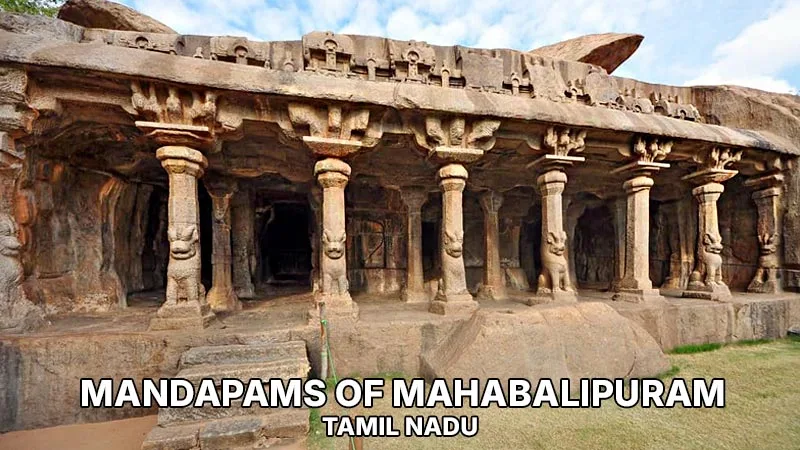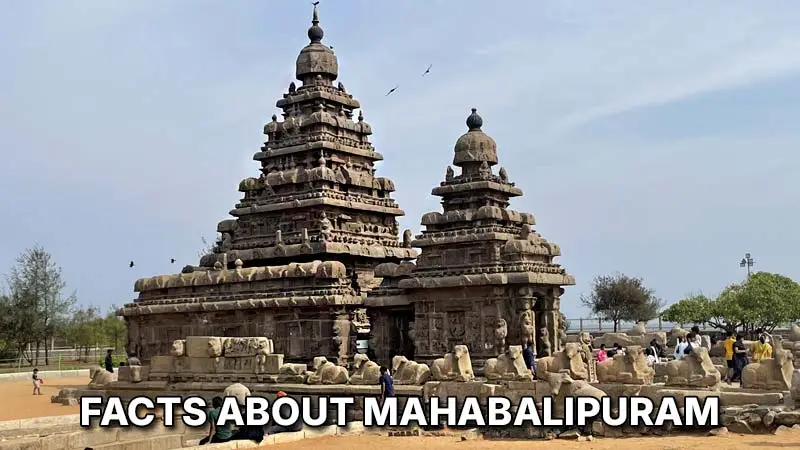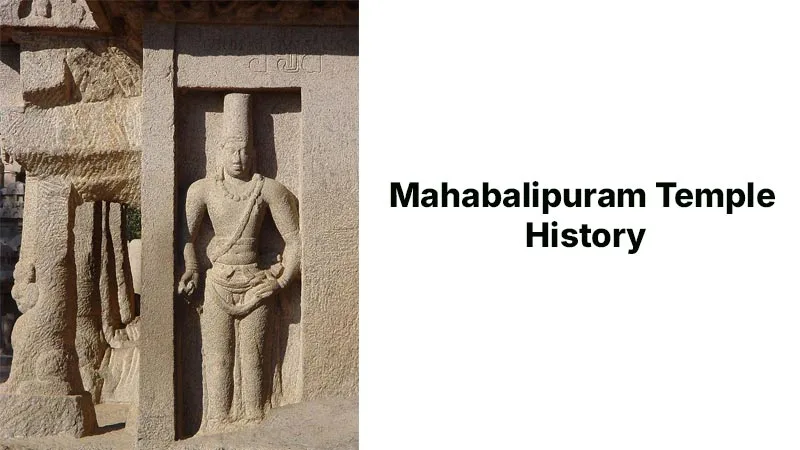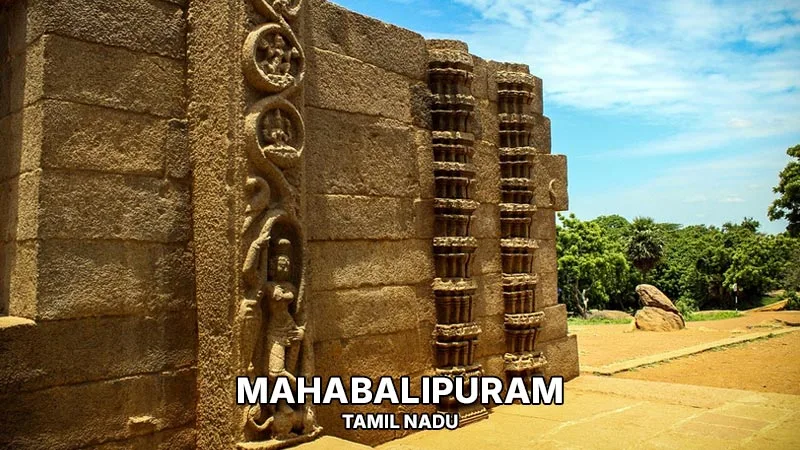Mahabalipuram, also known as Mamallapuram, is a UNESCO World Heritage Site on the southeastern coast of India in Tamil Nadu.
Renowned for its rock-cut temples, monolithic structures, and intricate carvings, the site reflects the architectural brilliance of the Pallava dynasty.
Among its treasures, the 14 mandapams (cave temples) stand out for their religious significance, artistic excellence, and historical importance.
This guide provides a detailed look at each mandapam, ordered by their significance, to help you plan your visit effectively.
Contents
- List of All the Mandapams of Mahabalipuram
- 1. Varaha Mandapam
- 2. Mahishasura Mardini Mandapam
- 3. Krishna Mandapam
- 4. Tirumurthi Mandapam
- 5. Adivaraha Cave Temple
- 6. Ramanuja Mandapam
- 7. Dharmaraja Mandapam
- 8. Kotikal Mandapam
- 9. Koneri Mandapam
- 10. Athiranachanda Mandapam
- 11. Kodikal Mandapam
- 12. Panchapandava Mandapam
- 13. Shiva Mandapam
- 14. Pandava Mandapam
List of All the Mandapams of Mahabalipuram
1. Varaha Mandapam
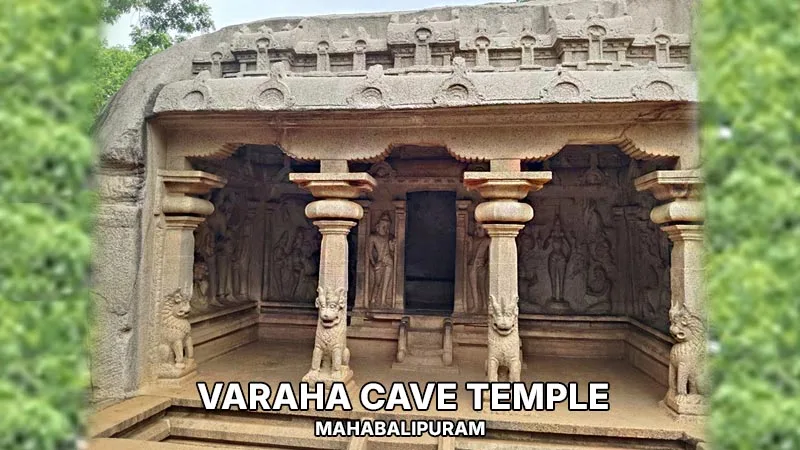
Varaha Mandapam is a significant cave temple in Mahabalipuram, dedicated to Lord Vishnu in his Varaha avatar. This temple is renowned for its intricate carvings and stands as a prime example of early rock-cut architecture in the region. The central carving of Varaha rescuing Bhudevi is a masterpiece, reflecting the Pallava dynasty’s artistic dedication.
| When to Visit | Best Time: November to February |
|---|---|
| Ideal Hours | Early morning or late afternoon |
What to Expect:
- Intricate carvings depicting mythological stories.
- A serene environment perfect for reflection.
- Opportunities for photography, especially in the soft light of morning or evening.
Visitor Tips:
To capture the intricate details, visit during the soft light of early morning or late afternoon. Dress modestly as a sign of respect for this sacred site.
2. Mahishasura Mardini Mandapam
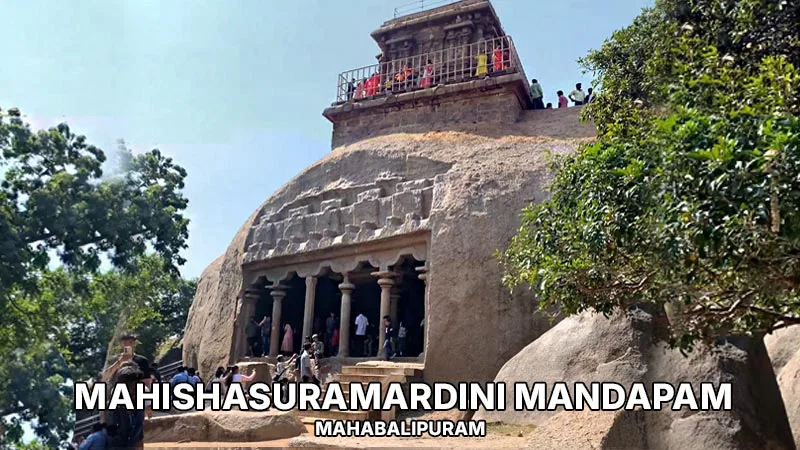
Mahishasura Mardini Mandapam is celebrated for its dynamic and powerful bas-relief of Goddess Durga slaying the buffalo demon Mahishasura. This mandapam is a highlight of Pallava art and a must-see for visitors to Mahabalipuram.
| When to Visit | Best Time: November to February |
|---|---|
| Ideal Hours | Early morning or late afternoon |
What to Expect:
- A powerful depiction of Durga’s battle against Mahishasura.
- Stunning reliefs of Anantasayana Vishnu.
- A spiritual and awe-inspiring atmosphere.
Visitor Tips:
Given the religious significance, it’s advisable to dress respectfully. Early morning visits are recommended for a quieter experience.
3. Krishna Mandapam
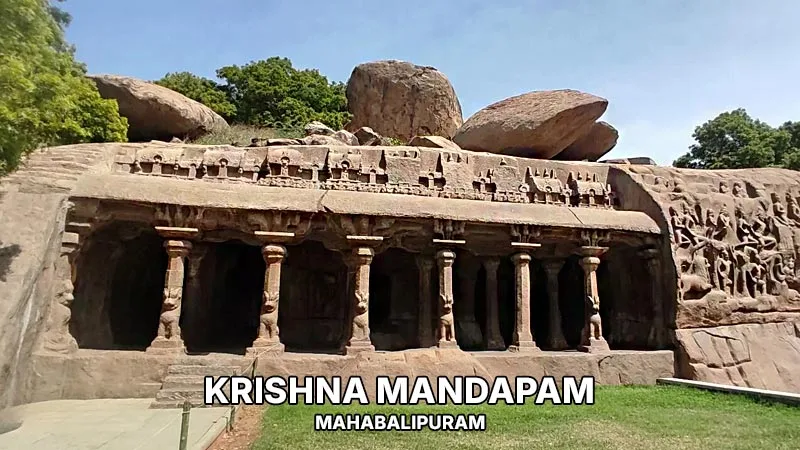
Dedicated to Lord Krishna, Krishna Mandapam features an extensive bas-relief panel illustrating Krishna lifting Govardhana Hill to shield villagers from a fierce storm. This mandapam is a key example of narrative art from the Pallava period.
| When to Visit | Best Time: November to February |
|---|---|
| Ideal Hours | Early morning or late afternoon |
What to Expect:
- A large, detailed bas-relief of Krishna lifting Govardhana Hill.
- Peaceful surroundings, perfect for contemplation.
- Less crowded, allowing for a more personal experience.
Visitor Tips:
Focus on the details of the narrative art. The site is generally less crowded, making it ideal for a quiet exploration.
4. Tirumurthi Mandapam
Tirumurthi Mandapam houses shrines dedicated to the three principal deities of Hinduism: Brahma, Vishnu, and Shiva. This mandapam reflects the Pallava dynasty’s commitment to religious inclusivity and artistic excellence.
| When to Visit | Best Time: November to February |
|---|---|
| Ideal Hours | Early morning or late afternoon |
What to Expect:
- Shrines dedicated to Brahma, Vishnu, and Shiva.
- Intricate carvings depicting religious themes.
- A quiet and reflective atmosphere.
Visitor Tips:
Photography is allowed, but it’s recommended to focus on the detailed carvings. Respectful behavior is encouraged due to the mandapam’s religious significance.
5. Adivaraha Cave Temple
Adivaraha Cave Temple is one of the few temples in Mahabalipuram that is still used for active worship. Dedicated to Vishnu’s Varaha avatar, this temple offers a blend of spirituality and history.
| When to Visit | Best Time: November to February |
|---|---|
| Ideal Hours | Morning visits are recommended |
What to Expect:
- A spiritually vibrant environment with ongoing rituals.
- Beautiful lion plinths and intricate carvings.
- A peaceful and intimate atmosphere.
Visitor Tips:
Dress modestly and consider visiting during ritual times for a more immersive experience.
6. Ramanuja Mandapam
Ramanuja Mandapam is dedicated to Lord Shiva and is known for its detailed carvings and association with the philosopher-saint Ramanuja. This mandapam is an important site for both religious and historical reasons.
| When to Visit | Best Time: November to February |
|---|---|
| Ideal Hours | Early morning visits are recommended |
What to Expect:
- Detailed carvings of Somaskandar and other religious figures.
- A connection to the philosophical and religious history of the region.
- A quiet and reflective atmosphere.
Visitor Tips:
This mandapam offers a reflective and quiet visit, with fewer crowds than the more famous mandapams.
7. Dharmaraja Mandapam
One of the earliest and most straightforward mandapams in Mahabalipuram, Dharmaraja Mandapam is characterized by its thick square pillars and minimalistic design. It represents the initial phase of Pallava temple architecture.
| When to Visit | Best Time: November to February |
|---|---|
| Ideal Hours | Morning or late afternoon |
What to Expect:
- Simple yet significant architecture representing the early Pallava period.
- A brief, insightful stop during your exploration of Mahabalipuram.
- A contrast to the more elaborate structures found elsewhere.
Visitor Tips:
This mandapam can be explored quickly, making it an ideal stop between other, more detailed sites.
8. Kotikal Mandapam
Kotikal Mandapam is a simple yet elegant structure dedicated to Goddess Durga. It is known for its slim and attractive Dwarapalakas (door guardians) and serves as a symbol of the divine feminine power.
| When to Visit | Best Time: Evenings, November to February |
|---|---|
| Ideal Hours | Late afternoon or early evening |
What to Expect:
- A peaceful setting with minimal crowds.
- Beautiful carvings of female door guardians.
- A deep connection with the divine feminine energy.
Visitor Tips:
This mandapam is less crowded, making it an excellent choice for those looking to escape the hustle and bustle of the more popular sites.
9. Koneri Mandapam
Koneri Mandapam is unique in Mahabalipuram for its combination of square and circular pillars, offering a blend of architectural styles that mark the transitional phase of Pallava temple design.
| When to Visit | Best Time: November to February |
|---|---|
| Ideal Hours | Early morning or late afternoon |
What to Expect:
- A blend of square and circular pillars showcasing architectural evolution.
- Fewer crowds, allowing for a peaceful exploration.
- Insights into the transitional phases of temple construction.
10. Athiranachanda Mandapam
Athiranachanda Mandapam is notable for its inscriptions, including some of the earliest examples of Pallava Granth and Devanagari scripts in the region. This mandapam is a testament to the literary and religious achievements of the Pallavas.
| When to Visit | Best Time: November to February |
|---|---|
| Ideal Hours | Early morning for a quieter experience |
What to Expect:
- Historical inscriptions in Pallava Granth and Devanagari scripts.
- A focus on the literary and religious achievements of the Pallavas.
- A quiet and intellectual experience.
Visitor Tips:
Take time to read the inscriptions and consider their historical context. This mandapam is best explored at a leisurely pace.
11. Kodikal Mandapam
Kodikal Mandapam, dedicated to Goddess Durga, is known for its simplicity and the presence of two female Dwarapalakas. This mandapam exemplifies the early stages of Pallava rock-cut architecture.
| When to Visit | Best Time: Evenings, November to February |
|---|---|
| Ideal Hours | Late afternoon or early evening |
What to Expect:
- Simplicity in design with a focus on the divine feminine.
- Beautifully carved Dwarapalakas guarding the entrance.
- A peaceful environment for quiet reflection.
Visitor Tips:
Since this mandapam is smaller and less detailed, it can be explored quickly, making it a good stop on a broader tour of Mahabalipuram.
12. Panchapandava Mandapam
Panchapandava Mandapam is associated with the five Pandava brothers from the Mahabharata. This mandapam, while less ornate than others, is significant for its cultural and religious connections.
| When to Visit | Best Time: November to February |
|---|---|
| Ideal Hours | Morning or late afternoon |
What to Expect:
- Cultural and religious significance tied to the Mahabharata.
- Simple architecture with minimal decoration.
- A brief but meaningful visit.
Visitor Tips:
This mandapam is best visited as part of a larger tour of Mahabalipuram, as it can be explored quickly.
13. Shiva Mandapam
Shiva Mandapam is dedicated to Lord Shiva and represents the early stages of Pallava temple architecture. The mandapam is less ornate but holds historical significance for its dedication to one of Hinduism’s principal deities.
| When to Visit | Best Time: Mornings, November to February |
|---|---|
| Ideal Hours | Early morning for a peaceful experience |
What to Expect:
- A straightforward structure focusing on early Shiva worship.
- Minimalistic design, allowing for a focus on spiritual reflection.
- A brief visit with a focus on historical significance.
Visitor Tips:
This mandapam can be visited quickly, making it a good stop during a broader tour of Mahabalipuram.
14. Pandava Mandapam
Pandava Mandapam is associated with the five Pandava brothers from the Mahabharata. It is one of the less ornate mandapams in Mahabalipuram but holds cultural and religious significance.
| When to Visit | Best Time: November to February |
|---|---|
| Ideal Hours | Early morning or late afternoon |
What to Expect:
- Cultural significance tied to the Mahabharata.
- Simple architecture with minimal decoration.
- A reflective and peaceful visit.
Visitor Tips:
This mandapam is best explored as part of a larger tour of Mahabalipuram, offering a quick but meaningful experience.

